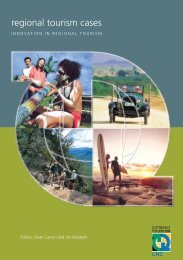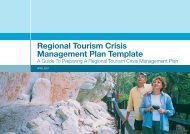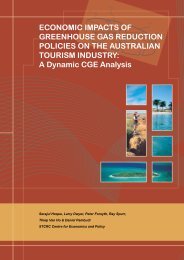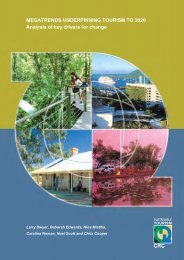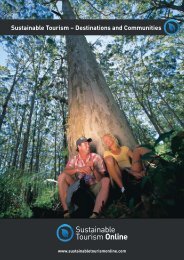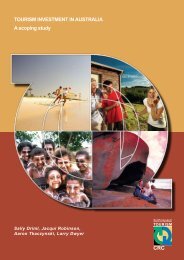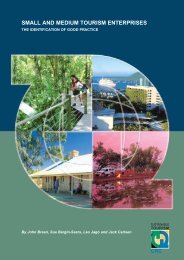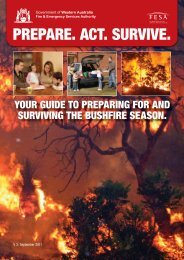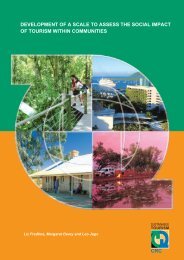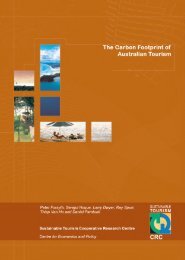Tourism Risk Management - Sustainable Tourism Online
Tourism Risk Management - Sustainable Tourism Online
Tourism Risk Management - Sustainable Tourism Online
You also want an ePaper? Increase the reach of your titles
YUMPU automatically turns print PDFs into web optimized ePapers that Google loves.
B) Flexibility in promotion<br />
• Create new niche market products<br />
Packages should be targeted at the most resistant market segments such as golf, skiing, sporting<br />
events, culture, honeymoons.<br />
• Target experienced and special interest travellers<br />
Experienced travellers and repeat visitors are less likely to be deterred by a crisis. Individual<br />
travellers with a particular passion, be it scuba diving, mountain climbing, or archaeology, will go<br />
where they need to go to enjoy their hobby.<br />
• Create special price offers<br />
Rather than engaging in price wars in a crisis-stricken region, or slashing prices across the board,<br />
create special offers. Malaysia and Sri Lanka build their special offers around holiday weekends and<br />
festivals. The key is not necessarily to offer the cheapest prices, but rather to offer value-for-money.<br />
• Quickly shift promotion to most promising markets<br />
Be prepared to shift promotional campaigns to markets that promise the most resilience. Usually<br />
these are the source markets closest to home because travellers there are more familiar with your<br />
destination. But pay attention to research and beware of wasting money on markets that are not yet<br />
ready to travel. A joint Caribbean ad campaign recently launched to win back US visitors had little<br />
effect because Americans were still wary of going abroad.<br />
• Step up promotion to domestic market<br />
In larger countries, domestic tourism can make up for lack of foreign demand during the recovery<br />
period. The Bali <strong>Tourism</strong> Board began promoting to the domestic market following the terrorist<br />
bombing in order to keep hotels functioning. Persian Gulf visitors vacationed closer to home and kept<br />
hotels in Dubai, Bahrain and other Arab countries operating following the September 11 attacks.<br />
<strong>Tourism</strong> officials were surprised to discover they spent more than long-haul visitors.<br />
• Increase familiarization trips for tour operators and special events<br />
As soon as the situation permits, bring in tour operators and travel agents to see what has been done<br />
to restore the destination. Organize special events and meetings to create an opportunity to<br />
communicate with your partners in the travel trade and with the international community.<br />
• Take travel advisories seriously<br />
Establish contact with governments that have issued travel advisories against the destination.<br />
Provide a regular flow of information on the crisis, including details of the exact location of the<br />
incident, what is being done to make the area more secure and where and when it is safe for visitors<br />
to travel. Begin lobbying relevant governments and invite representatives to see the situation<br />
themselves.<br />
• Intensify cooperation<br />
A crisis brings people together in a spirit of solidarity and cooperation that is essential to a quick<br />
recovery. Improve coordination among tourism promotion boards throughout the country and<br />
redouble collaboration between public and private sectors in marketing campaigns. Also explore the<br />
possibility of multi-country regional promotions and products.<br />
<strong>Tourism</strong> <strong>Risk</strong> <strong>Management</strong> – An Authoritative Guide to Managing Crises in <strong>Tourism</strong> 81



